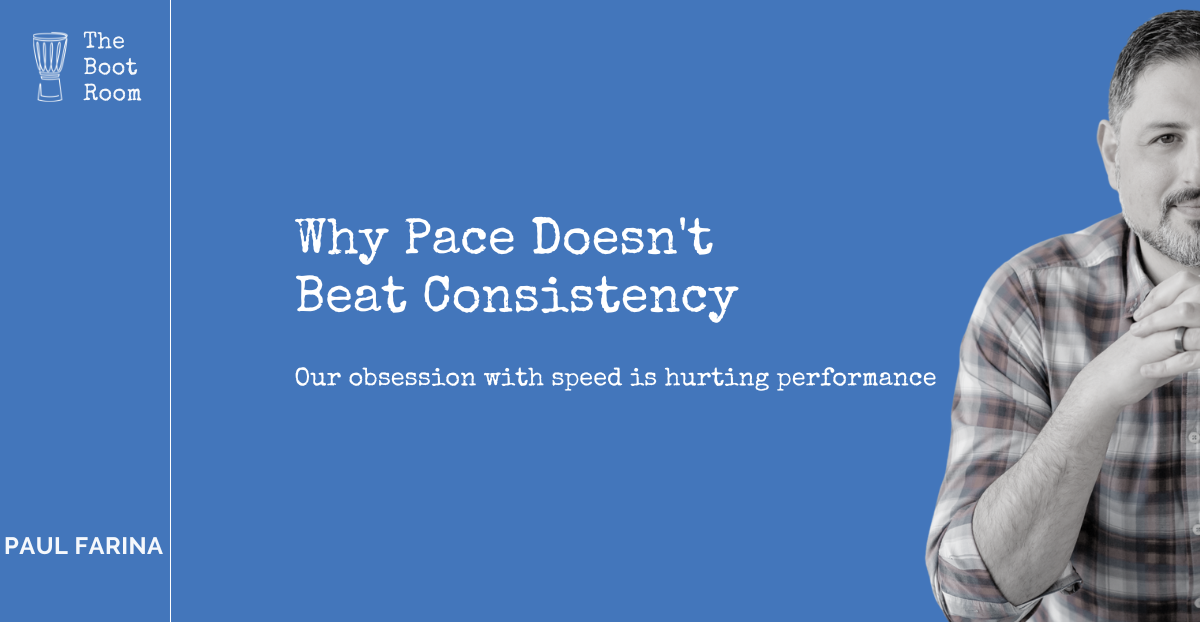Why Pace Doesn't Beat Consistency
The marquee moment at the Olympics is the 100m sprint. But, traditionally it is the marathon which headlines the games as the last event.
Just like any concert or performance it is the last act that creates the climax and therefore is considered the main event. In F1, there is the Sprint Race but the Grand Prix is worth a lot more in terms of points and prestige. Staying with racing, the 24 hour Le Mans to this day is the crowning achievement for any manufacturer as the ultimate endurance test of man and machine. In cycling, the Tour De France is held over 23 days and is the one event any non-cycling enthusiasts cares about and is once again is the most prestigious event in the sport.
The Melbourne Cup, Bathurst, 5-set matches in Major Tennis Tournaments, and of course, Test Cricket. All are considered the pinnacle of their sport. The event worth watching even if you have no invested interest. And, for those that do, they care more about these with almost religious-level-passion.
In a world where speed, pace, and 'quicker' is valued more than anything else, how is that we as a species still cannot shake the value of epic longer forms of our sports? In entertainment, Joe Rogan and Steven Bartlett have shown the power and popularity of long-form podcasting while movies seem to be getting longer and longer every year (the average of a commercially successful movie has increased to 141 minutes!)
Our obsession with pace may be fighting the reality of where real worth and value come from.
Lately, I have been asked a lot about cricket and my cricketing career. It is so long ago that the sport they play today is very different. But, one thing holds true today and is the same as what it was 20, or even 40 years ago - express pace bowling is exciting, amazing, and tantalising. But it is the slower forms of bowling that have always been and continue to be the most effective assets.
In cricket, you can only win one way - by bowling the other team out. Therefore a bowling attack needs to have the capability to take 10 wickets (20 in Test Matches) or it simply will not win any contests. This applies to junior country cricket all the way through to International Test Cricket. So, the question every coach, high-performance department, and club are forced to ask is, 'how do we bowl them out?'
A chat group I am involved in called Chin Music shared the below Facebook Reel and it opened up the discussion - who would you choose to have on your team out of Ryan Harris (a medium pace seem bowler) or Mitch Johnson (a scary-quick strike bowler)?
In the Reel, even the most uninterested cricket non-enthusiast can spot the difference between them. We also get to see an English Captain be made to look silly, not once but twice 😂:
WATCH: Draught Sports: Who you taking?
Without hesitation everyone in the group said they'd have Harris bowling for them instead of Johnson.
The most knowledgeable cricket historian of our group pointed out how Johnson had three amazing series, but Harris never had a bad one. Harris' consistency, reliability, and persistence created the value – something every leader can empathise with when reflecting on what they value most in their team. Experience tells us we all would take these traits over talent, charisma, and X factor (or what I refer to as, The Flash in the Pan) when it comes to our generals, lieutenants, and foot soldiers.
Harris and Johnson had different roles and both types of players are important to a team's set up. But, I feel the slow bowler is undervalued. This perception was the number one reason I quit cricket prematurely at the age of 24. I didn't think I was quick enough and therefore good enough.
What I have learnt in the decades since is that I was wrong.
In my case, I heard and repeated this 'not quick enough' narrative to myself directly undermining my confidence. Which led to lowered self-efficacy, which led to lowered performance and paved the way towards early retirement. I had injury issues and other interests, but at the core it was a lack of belief that stopped me progressing.
We must acknowledge there is a possibility that I never had the ability or possibility to play at the top level, however, the critical point is I never had a chance to find out.
It makes me wonder about the hundred of talented young cricketers out there buying into this narrative of 'you're too slow' which undermines their performance. And, the bigger question of the sheer volume of professionals out there feeling a sense of failure because their world is telling them they are too slow and not good enough as deadlines and targets get missed.
In a world that craves pace are we strong enough to ask the question, 'is more speed really what we need?'
We are taught the fable of The Hare and Tortoise as children. But, we dismiss it in our everyday lives. I wonder if our results would be more impactful and striking if we decided to do less, do tasks slower, and invest in quality over quantity.
I can hear the chorus of "Yere, but...!" already. But, if we dare to dig deeper into our systems, communication, and business strategies, I have zero doubt innumerable challenges would dissolve away.
Slow endurance is epic. Speed is required and has its value, but it is not the difference maker we perceive it to be if we are truly interested in real performance and leading change that matters.

